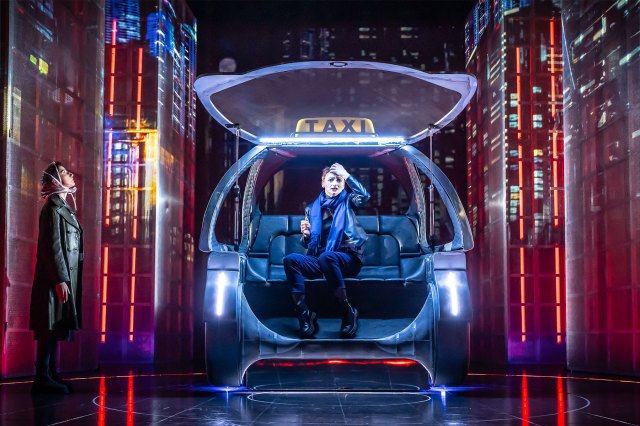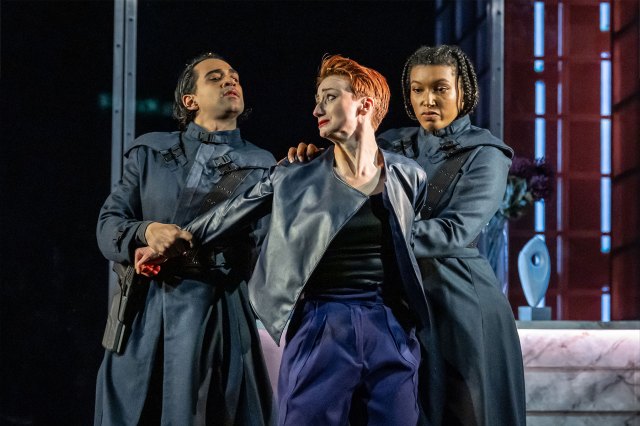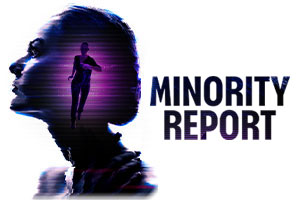Minority Report at Lyric Hammersmith Theatre review – visually stunning but dramatically unsatisfying
David Haig’s stage adaptation of the sci-fi thriller runs until 18 May

It’s all a long way from Tom Cruise running across the screen in a futuristic world. David Haig’s adaptation of Minority Report owes more to the Philip K Dick short story on which the 2002 Steven Spielberg film was based than on the now-classic action movie.
In fact, it stalks its own course, turning both into a rather English version of the tale, neither as propulsive as the film nor as morally challenging and bleak as the text. Despite a virtuoso production by Max Webster and his design team, which transforms a tiny stage into a richly realised vision of the near future, it never quite grips as drama.
It begins in 2050, as neuroscientist Dr Julia Anderton (Jodie McNee) addresses a conference on the tenth anniversary of British Pre-Crime – an organisation that uses scans to predict when people are about to kill or commit a crime. It has, she claims, made the UK safer and better; Fleming (Danny Collins), the protestor who interrupts her speech, points out that it has also taken away free will and may be jailing the innocent for acts they will never perform. When the system shows that Anderton is about to murder someone, she goes on the run, unable to believe the truth of what it is saying.

Webster, who directed the award-winning Life of Pi and therefore knows a thing or two about bringing impossible visions to the stage, mounts the subsequent action with great verve and intensity. Jon Bausor’s design conjures towering skyscrapers, the lights of Tai Rosner’s brilliantly inventive videos flickering across raised and lowered gantries as Lucy Hind’s choreography sends the characters hurrying and scurrying in fiercely panicked steps.
Jessica Hung Han Yun’s lighting, and Nicola T Chang’s sound design all build the sense of a society out of joint, full of shadowy figures and slanting rain. The team, with illusionist Richard Pinner on board, pull off magical effects like flying police cars, and the bodies of the pre-cogs – the humans who serve the computer’s predictions – floating in a huge vat of fluid, like so many full-sized embryos. A virtual helper David (Tanvi Virmani) appears and glitches convincingly.
Yet all this visual energy can’t disguise the fact that the narrative swings between exposition and plot; the characters are either running across the stage or explaining the technology and choices that have led to this predicament. Great gobbets of ethical discussion never quite weave themselves into the action; they always feel as if they are overlaid, like so many protruding wires.
Haig has given Anderton a murdered twin sister, supposedly her motivation for her belief – she never wants anyone to die ever again. But we are told repeatedly about her emotional bond to this sibling, without ever truly feeling it. The complications of the final reveal are sudden and unsatisfactory.
Weirdly too, because AI is so much a part of our current debates about how we want the future to unfold, this version of Minority Report suddenly feels like a period piece. In a world where deep fakes are revealed on social media every day, and where truth and computer-generated lies are ever more muddled, the story feels less relevant than it should. It looks magnificent, but it never really digs below its sharp, hi-tech surface.

















